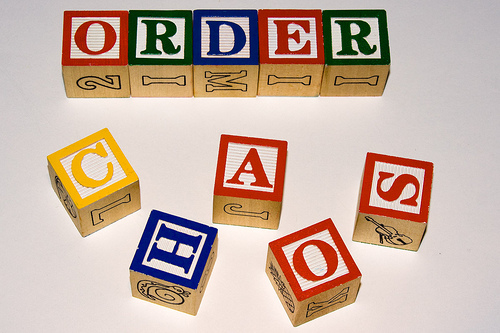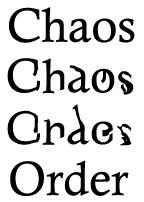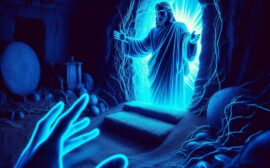At times, life seems chaotic. It appears that the harder one tries to make sense of the world, the more bizarre it becomes. I recently told my dad, “Just when I think that things cannot get any worse, something happens to demonstrate how much worse it can become.” However, the more I have studied God, the more I realize that chaos is an illusion. If God is what the Bible purports Him to be, then God is omnipotent (all powerful), omniscient (all-knowing), omnipresent (present in all places), a se (unchangeable), immortal (eternal and timeless), holy (the perfect good) and indestructible (incapable of being destroyed). If this is true, then nothing takes God by surprise. In addition, this means that the chaos of the world is fitting within the sovereign plan of God. But wait, isn’t there a lot of evil things taking place in the world? What comfort can we find in these attributes of God?
Joseph was a man who was met with severe forms of evil. He was thrown into a pit by his jealous brothers and was eventually sold as a slave. The people who were supposed to have loved Joseph the most performed one of the highest acts of treachery and evil. Yet, the tables turned for Joseph. Joseph would eventually score a high-ranking position in Egypt under the Pharaoh. His brothers sought help from Egypt. It was then that Joseph was able to forgive and say to his brothers, “Do not fear, for am I in the place of God? As for you, you meant evil against me, but God meant it for good, to bring it about that many people should be kept alive, as they are today” (Genesis 50:21).[1] How could Joseph say such a thing? There are three things that must be kept in mind.
Human actions are free, but planned by God.
There are two seemingly opposing viewpoints offered in the Bible: humans have freedom of the will and God is sovereign (in complete control). How does one reconcile these two truths? Hardline Calvinists (or hyper-determinists)[2] will say that people have no choice in any matter. Hyper-Arminians, especially of the Open Theist variety, will claim that God does not know what will happen. Yet, I feel that the more moderate Thomistic (and even Molinist) compatibilist interpretations fit the realm of Scripture. For instance, the writer of Proverbs notes that “The heart of a man plans his way, but the LORD establishes his steps” (Proverbs 16:9). That means that man plans his/her steps, but God foreknows and has already established such a free act. Proverbs also states that “The lot is casts into the lap, but its decision is from the LORD” (Proverbs 16:33). I like how the New Living Translation translates this verse. The NLT reads, “We may throw the dice, but the LORD determines how they fall” (Proverbs 16:33, NLT).[3] This may not be good news for the one who goes to Vegas. But free human actions fall into the sovereign plan of God.
God will bring forth an ultimate good despite the seeming chaos of human actions.
Paul writes, “And we know that for those who love God all things work together for good, for those who are called according to his purpose” (Romans 8:28). This does not mean that all things will work in the end for all people. It will work for the good to those who love God and have submitted to his will. God is good and God is powerful. This means that God will bring an ultimate good despite the great evil in the world. Joseph was met with great evil, but he knew that God would use that evil to bring about an ultimate good.
Thus, chaos is an illusion as God is sovereign.
Two classic theologians note that chaos is seemingly an illusion due to the great attributes of God. Norman Geisler writes,
“God is a simple Being, all of whose attributes are one with His indivisible essence. He has no parts; He is one in essence. If He had different parts, He could come apart, but He is immortal and indestructible…But if God is simple (absolutely one), then both foreknowledge and predetermination are one in Him. That is, whatever God knows, He determines. And whatever He determines, He knows. More properly, we should speak of God as ‘knowing determining’ and ‘determinately knowing’ from all eternity everything that happens, including all free acts. If God is an eternal and simple Being, then His thoughts must be eternally coordinate and unified” (Geisler 2010, 145).
Thus, God’s knowledge and actions do not negate free will. Nevertheless, God knows absolutely what free beings will choose. Therefore, God is able to place people in certain times and places, knowing what those beings will choose. Therefore, even with human freedom and the seeming chaos that ensues from bad human decisions, God still is moving to bring things to a greater good. Thomas Aquinas writes,
“It should be noted, however, that with natural things the specification of the act is from form and the exercise is from the agent that causes the motion. But the mover moves for the sake of an end. Thus the first principle of motion with respect to the exercise of the act is from the end…It should be said that man’s will is discordant with the will of God insofar as it wills something God does not want it to will, as when it wills to sin” (Aquinas 1998, 557, 561).
In other words, God does not order evil. God does not will evil to exist, yet evil is the natural outgrowth of the human freedom to will. God is moving upon all of creation with his grace. However, human beings misuse the grace of God afforded to them. God knows that they would. Thus, God is able to use human free decisions to bring about the ultimate good.
All of this is to say, chaos is an illusion. God is working to bring about the greater good which will be actualized in eternity.
Conclusion—the Roller Coaster
I am not a fan of roller coasters. I don’t like the drops and turns as it makes my stomach very queasy. When I dated my wife, I tried to act like a macho man and ride roller coasters with her…I eventually became sick. Roller coasters give the illusion of chaos. However, coasters are designed to provide that experience while they bring the person back to a common end. Life seems to be much like this. Things may appear to be chaotic, but a good, loving, Almighty God has an order and a plan.
Joseph realized that what man meant as evil, God used for the greater good. When we keep this perspective, we will realize that God has an order despite the seeming chaos of the times. Understand, God is still in control. Don’t despair. Don’t lose hope. God will bring an ultimate good out of the midst of great chaos.
© November 2, 2015. Brian Chilton
Sources Cited:
Aquinas, Thomas. “On Human Choice. Disputed Question of Evil, 6 (1266-72). In Thomas Aquinas: Selected Writings. Edited and Translated by Ralph McInery. London, UK; New York: Penguin Classics, 1998.
Geisler, Norman. Chosen But Free: A Balanced View of God’s Sovereignty and Free Will. Third Edition. Minneapolis: Bethany House, 2010.
[1] Unless otherwise noted, all Scripture comes from the English Standard Version (Wheaton: Crossway, 2001).
[2] Hyper-Calvinism does not represent the general Calvinist viewpoint. Some sects of Calvinism do hold to a hardline, or hyper-Calvinistic, interpretation. The hyper view is what is being discussed here.
[3] Scripture marked NLT comes from the New Living Translation (Carol Stream: Tyndale, 2013).






